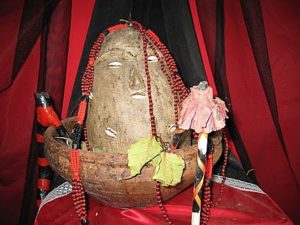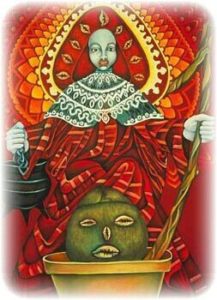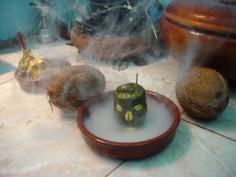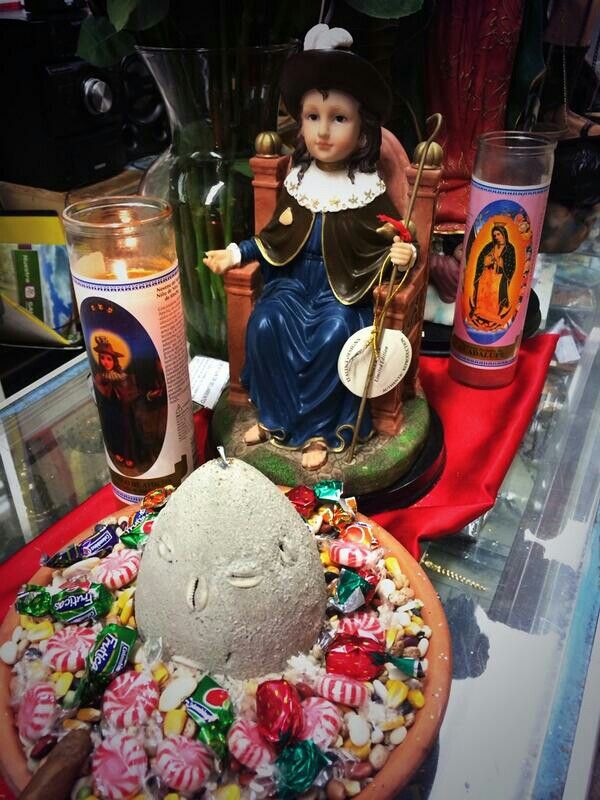The Yoruba religion has its origins in the Yoruba tribe in West Africa. The Yorubas lived in what is known today as Nigeria, along the Niger River. There was a time when they had a powerful and complex organized structure in a series of kingdoms, of which the most important was Benin, and it lasted for 12 centuries until 1896. Its reference point is the sacred city of Ifé.
The Yorubas named, identified and deified the energies of nature and called them Orishas; however, notwithstanding their diversity of deities, it can be considered as a monotheistic religion, since they regard Olodumare as the only and omnipotent god.
ORISHAS.
Elegguá
Elegguá is one of the seven fundamental gods of the Yoruba Pantheon. By its great importance is the first to be called in every religious act or festival and the last to say goodbye. The worshipers consider it the beginning and the end of all ways, birth and death, good and evil. Among the most important functions that this deity has is to be a messenger of the gods, if he wants it, nothing that is offered to them comes to them.
It is the first protection, since it is he who opens the ways to continue in religion. The uninitiated or aleyos must receive it or consecrate it as first. It is the sight that follows a path, becomes a fearsome and ferocious warrior when it joins Oggún and Oshosi, nothing stops it. Elegua is one of the first Oshas or Orishas to be received.
Attention
Ceremony of attention to Orisha
Elegguá won with Olofi and Orula sufficient privileges to be the first Okana. He greets him with 3 touches on the ground in front of him. Elegguá resides in the door, which marks the border between two worlds: the internal (tranquility of the home) and the external (danger and perversity).
At the beginning of his offering on Monday, before 12 o’clock, he washed himself at Elegguá and had him in the sun for a while and ready to receive his food. Three pints of ritual water are poured on the ground before him and it is said:
Omi tuto, Ana tuto, Tuto okan, Tuto laroye, Tuto elei.
He is spoken to, asked for Health (Didara), Luck (Oriré), Money (Owó) and Prosperity and you are prayed:
Master of all the four corners, greater of the way, father of mine, take the bad thing so that it can walk with health, that there are no sick, that there is no loss, that there is no revolution, that there is no death, in the name of all, I thank you my father Elegguá. (Elegguá laroye asu comaché ichá fofá guara omi tuto, ana tuto, tu tu babami cosi ikú, cosi aro, cosi ofó, arayé, cosi achelú, cosi éun afonfó molei delo omodei.)
Greeting: Echú elewa oga gbogbo namirin ita alagbana baba mi nulo na buruku nitosi le choncho kuelu kuikuo oki kosi ofo, kosi eyo, kosi ku, kosi ano ni orukó mi gbogbo omonile fú kuikuo odueve, baba mi elewa.
Greeting: I refresh you so that you open the way with the permission of my elderly parents, I play the maraca so that you open the door to achieve peace, prosperity, evolution, professional activity, money, love, stability, health, Firmness, happiness, abundance, harmony, wisdom and good luck, for me and for all my family and friends. Counting also with my guardian angel, godfather and all the representatives of the Yoruba pantheon.
Syncretism
As part of the transculturation and the danger of slaves brought to Cuba to lose their roots, each saint took the name of a Catholic saint. There is also the fact that the slaves came from different parts of Africa and in each one was called different.
Characteristics of your children
The children of Elegguá are intelligent and skilful, but unscrupulous. They are talkative and can sell to the impossible if they are allowed to speak. They are womanizer and little home, they like the street. They are inclined to corruption, scam, scam and political intrigues, which guarantees them success in life.
Afro-Cubanismo: Energías de la Naturaleza Yoruba. Orishas “Elegguá”
La religión yoruba tiene sus orígenes en la tribu Yoruba en el oeste de África. Los Yorubas vivían en lo que se conoce hoy como Nigeria, a lo largo del río “Níger”. Hubo un tiempo en el que tuvieron una poderosa y compleja estructura organizada en una serie de reinos, de los cuales el más importante era Benin, y éste duró por 12 siglos hasta el 1896. Su punto de referencia es la ciudad sagrada de Ifé.
Los Yorubas nombraron, identificaron y deificaron a las energías de la naturaleza y las llamaron Orishas, sin embargo, no obstante su diversidad de deidades, se puede considerar como una religión monoteísta, ya que consideran a Olodumare como dios único y omnipotente.
ORISHAS.
Elegguá.
Elegguá es uno de los siete dioses fundamentales del Panteón Yoruba. Por su gran importancia es el primero en ser llamado en todo acto religioso o festividad y el último en despedirse. Los adoradores lo consideran el inicio y el fin de todos los caminos, el nacimiento y la muerte, el bien y el mal. Dentro de las funciones más importantes que tiene esta deidad es la de ser mensajero de los dioses, si él lo quiere, nada de lo que se le ofrenda a estos les llega.
Es la protección primera, ya que es él quien abre los caminos para continuar en la religión. Los no iniciados o aleyos deben recibirlo o consagrarlo como primero. Es la vista que sigue un camino, se convierte en un guerrero temible y feroz cuando se une a Oggún y Oshosi, nada lo detiene. Eleguá es uno de los primeros Oshas u Orishas que se recibe.
Atención
Ceremonial de atención al Orisha
Elegguá ganó con Olofi y Orula suficientes privilegios para ser el primer Okana. Se le saluda dando 3 toques en el suelo delante de él. Elegguá reside en la puerta, que marca la frontera entre dos mundos: el interno (tranquilidad del hogar) y el externo (peligro y perversidad).
Al comenzar su ofrenda el lunes, antes de las 12, se lava a Elegguá y le tiene un rato expuesto al sol y así ya dispuesto a recibir su comida. Se derraman en el suelo ante él, tres chorritos de agua de ritual y se dice:
Omi tuto, Ana tuto, Tuto okan, Tuto laroye, Tuto elei.
Se le habla, se le pide Salud (Didara), Suerte (Oriré), Dinero (Owó) y Prosperidad y se le reza:
Dueño de todas las 4 esquinas, mayor del camino, padre mío, llévate lo malo para que pueda caminar con salud, que no haya enfermos, que no haya pérdida, que no haya revolución, que no haya muerte, en el nombre de todos, le doy gracias padre mío Elegguá. (Elegguá laroye asu comaché ichá fofá guara omi tuto, ana tuto, tú tu babami cosi ikú, cosi aro, cosi ofó, arayé, cosi achelú, cosi éun afonfó molei delo omodei.)
Saludo: Echú elewa oga gbogbo namirin ita alagbana baba mi nulo na buruku nitosi le choncho kuelú kuikuo oki kosi ofo, kosi eyo, kosi ku, kosi ano ni orukó mi gbogbo omonile fú kuikuo odueve, baba mi elewa.
Saludo: Te refresco a ti para que abras el camino con el permiso de mis padres mayores, yo toco la maraca para que tú me abras la puerta para lograr la paz, prosperidad, evolución, actividad profesional, dinero, amor, estabilidad, salud, firmeza, felicidad, abundancia, armonía, sabiduría y buena suerte, para mí y para todos mis familiares y amigos. Contando también con mi ángel guardián, padrino y todos los representantes del panteón Yoruba.
Sincretismo
Como parte de la transculturación y del peligro que vieron los esclavos traídos a Cuba de perder sus raíces, cada santo adoptó el nombre de un santo católico. También está el hecho de que los esclavos venían de diferentes partes de África y en cada uno se le llamaba diferentes.
Características de sus hijos
Los hijos de Elegguá son inteligentes y hábiles, pero poco escrupulosos. Son habladores y pueden vender hasta lo imposible si se les deja hablar. Son mujeriegos y poco caseros, les gusta la calle. Se inclinan a la corrupción, el timo, la estafa y las intrigas políticas, lo que les garantiza el éxito en la vida.
Agencies/Various/EcuRed/Internet Photos/Arnoldo Varona/TheCubanHistory.com
THE CUBAN HISTORY, HOLLYWOOD.












